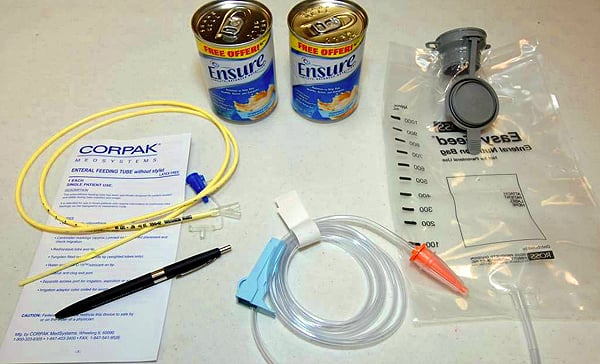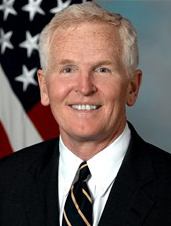
Correction, June 11, 2009: Scott Horton writes in to point out that Ward Casscells’s term as assistant secretary of defense ended April 28. I had written that my interview took place in May, but of course the interview took place in April, before Casscells left office, as corrected below. Interestingly, the Pentagon has yet to announce a permanent successor.
The apparent suicide Monday of thirty-one-year-old Muhammad Ahmad Abdallah Salih, who had been protesting his long imprisonment at Guantánamo Bay by refusing to eat, has brought U.S. force-feed policy back into the news. Many human rights organizations have called for an end to force-feeding, which as practiced at Guantánamo amounts to torture. In MayApril, for an article to be published in the July Harper’s Magazine, I attempted to query Dr. Ward Casscells, then the assistant secretary of defense for health affairs, about how he might modify that policy since Barack Obama had become president. Cynthia Smith, a Pentagon spokesperson, responded to my written queries (which I have edited here for length) under the requirement that I attribute the answers to her and not Casscells. At the time of the interview, at least thirty prisoners at Guantánamo were being restrained and fed via enteral tube.
1. U.S. Circuit Judge Gladys Kessler found in February that her court lacked jurisdiction to determine the legality of force-feeding procedures at Guantánamo. She wrote, “Resolution of this issue requires the exercise of penal and medical discretion by staff with the appropriate expertise, and is precisely the type of question that federal courts, lacking that expertise, leave to the discretion of those who do possess such expertise.” This decision would seem to give Dr. Casscells, who sets the policy at Guantanamo, considerable authority. Is it his personal determination that force-feeding, including the use of restraint chairs, is within the bounds of U.S. and international law?
DoD’s policy regarding treatment of hunger strikers is consistent with that used by the Federal Bureau of Prisons under U.S. law. The principle of using appropriate medical intervention, when necessary to sustain the life or health of a hunger striker in U.S. custody, has been upheld in Federal Courts.
2. Judge Kessler also declined to grant an injunction against force-feeding on grounds that forbidding the use of restraint chairs would make prison personnel “vulnerable to concerted efforts by detainees to use the forced-feeding as an opportunity to inflict harm on medical and military personnel.” Many observers have noted that this claim presents a logical quandary. If the prisoners are in danger of imminent death, one must assume that, by definition, they would lack the strength to present a threat to medical or military personnel. And yet if they are in fact strong enough to present a threat to medical or military personnel, then the claim of “imminent death” no longer carries legal or ethical relevance. How do you address this seeming paradox?
Involuntary treatment may be authorized when, in the opinion of the attending physician, continued refusal of food or water would pose a significant threat to life or health of the hunger striker. This does not mean that the hunger striker would necessarily be unconscious or so weak that assaultive behavior could not occur. Moreover, one could expect that the strength and vitality of the hunger striker would begin to return once enteral feeding is started. Use of appropriate restraints protects both the hunger striker and medical professionals performing medical procedures from possible injury.
3. In 2007, Dr. Casscells told a military reporter that he has “not seen anything that suggests the feeding policy is wrong.” Since then, Dr. Paul Bouvier, a senior medical adviser for the International Committee of the Red Cross, told me that he has spoken with Dr. Casscells about these issues, and though he declined to characterize the nature of the conversation, he did note that many human rights organizations have called for an end to force-feeding, as have the American Medical Association, the World Medical Association, and the International Committee of the Red Cross. Have such calls changed Dr. Casscells’s views?
The Department of Defense respects and values the opinions and advice of the International Committee of the Red Cross. However, the Department also takes very seriously its obligation to sustain the life and health of those in its custody. We view the current policy to preserve the life and health of detainees engaging in hunger strikes, attempted suicide, or other attempted serious self-harm as consistent with that obligation and U.S. law.
4. Dr. Casscells also told the military reporter, “Tube feeding is a complicated issue because the detainees are not American citizens, they are not prisoners of war, nor are they criminals in the usual sense. They have this controversial status, which makes the circumstances difficult.” Has he revised this opinion in light of the January 22 executive order requiring that all Guantánamo detainees be treated in accordance with Common Article 3 of the Geneva Conventions, which specifically forbids “outrages upon personal dignity, in particular humiliating and degrading treatment”?
 Common Article 3 provides guidance that detained personnel shall be treated humanely. It also states that “The wounded and sick shall be collected and cared for.” DoD takes very seriously its obligation to provide humane treatment, which includes protecting detainees’ physical and mental health and providing appropriate treatment for disease, guided by professional judgments and standards similar to those applied to personnel of the U.S. Armed Forces. DoD’s policy of providing care to sustain the life and health of hunger strikers is consistent with Common Article 3.
Common Article 3 provides guidance that detained personnel shall be treated humanely. It also states that “The wounded and sick shall be collected and cared for.” DoD takes very seriously its obligation to provide humane treatment, which includes protecting detainees’ physical and mental health and providing appropriate treatment for disease, guided by professional judgments and standards similar to those applied to personnel of the U.S. Armed Forces. DoD’s policy of providing care to sustain the life and health of hunger strikers is consistent with Common Article 3.
5. The World Medical Association’s Malta Declaration unambiguously forbids doctors from force-feeding competent prisoners on hunger-strike. It says, “Forcible feeding is never ethically acceptable. Even if intended to benefit, feeding accompanied by threats, coercion, force, or use of physical restraints is a form of inhuman and degrading treatment.” Does Dr. Casscells believe that the WMA is incorrect that using physical restraints is a form of inhuman and degrading treatment?
We do not believe that use of physical restraints, as needed, to protect the safety of both the detainee and medical professionals in accomplishing an appropriate medical intervention to preserve the life and health of the detainee is inhuman or degrading. The use of appropriately monitored restraints in the administration of enteral feeding protects hunger strikers from possible injury and medical professionals from the risk of physical assault.
6. The International Committee of the Red Cross recently commented on the Walsh Report, saying it “disagrees” with “the report’s recommendation supporting forced-feeding of detainees.” Similarly, Bernard Barrett, a media spokesperson for the ICRC, told me, “The ICRC is opposed to the forced feeding of hunger strikers.” And Dr. Hernan Reyes, an ICRC specialist on the medical aspects of detention, wrote more specifically in 1998 that doctors “should never be party to actual coercive feeding, with prisoners being tied down and intravenous drips or esophageal tubes being forced into them. Such actions can be considered a form of torture, and under no circumstances should doctors participate in them, on the pretext of ‘saving the hunger striker’s life.’” Is it your position, in this light, that Guantánamo policy is consistent with the requirements of Common Article 3 of the Geneva Conventions?
We believe that providing life sustaining care to hunger strikers, even involuntarily if necessary, is consistent with the obligation under Common Article 3 to treat detainees humanely. A commonly stated belief in discussions of the WMA guidelines for treatment of hunger strikers is that most hunger strikers do not intend to harm themselves or to die. DoD experience with hunger strikers over several years, however, suggests that at least some would be very willing and even anxious to take their hunger strike “all the way” (to death). It is also extremely difficult for clinicians to judge whether individual hunger strikers are making autonomous decisions or are under orders from superiors to participate in a hunger strike. DoD’s policy provides assurance for those detainees acting under orders from superiors that medical personnel will seek authority to act to prevent physical harm or death from hunger striking. This is no “pretext.” The policy does save lives. Idly watching detainees for whose care we are responsible engage in self-starvation to the point of permanent damage to health or death is not required by U.S. law, Common Article 3, or medical ethics.















































































































